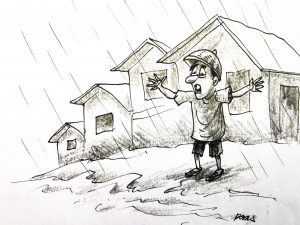Flooding has become a recurring concern anywhere in the country including our region, even during periods of limited rainfall, disrupting daily life and posing significant risks to health, property, and infrastructure. This problem lies in a mixture of factors that should be addressed if we are to mitigate the impact of flooding and ensure the safety and well-being of our communities.
One such factor contributing to frequent flooding is inadequate urban planning. Rapid urbanization has led to the proliferation of informal settlements and poorly designed infrastructure. This haphazard development often encroaches on natural waterways, blocking the water flow and aggravating the effects of even minimal rainfall. Without proper zoning regulations and enforcement, these areas become highly susceptible to flooding, as rainwater has nowhere to go but into homes and streets.
Deforestation is another critical issue that aggravates our flooding problems. Trees and vegetation play a vital role in absorbing rainwater and stabilizing soil. Widespread deforestation, particularly in upland areas, has significantly reduced this natural barrier. As a result, rainwater flows unimpeded into low-lying areas, overwhelming drainage systems and causing flash floods. The loss of forest cover also contributes to soil erosion, which can clog rivers and streams, further reducing their capacity to handle excess water.
Poorly maintained drainage systems are a third contributing factor. In many communities, drainage infrastructure is either outdated or inadequately maintained. Blockages caused by garbage, silt, and other debris prevent water from flowing freely, leading to localized flooding even during light rain. Additionally, the lack of investment in upgrading these systems means they are often unable to cope with increased rainfall brought on by climate change. As a result, even modest amounts of rain can cause significant disruption.
The lack of effective policy enforcement exacerbates the problem. While there are regulations in place to address issues like illegal logging, waste disposal, and construction in flood-prone areas, enforcement is often weak or inconsistent. This lax attitude towards environmental and urban policies allows harmful practices to continue unchecked, leaving communities vulnerable to flooding. Effective governance, coupled with community engagement, is therefore essential to ensure that these regulations are upheld, and necessary measures are taken to mitigate flood risks.




